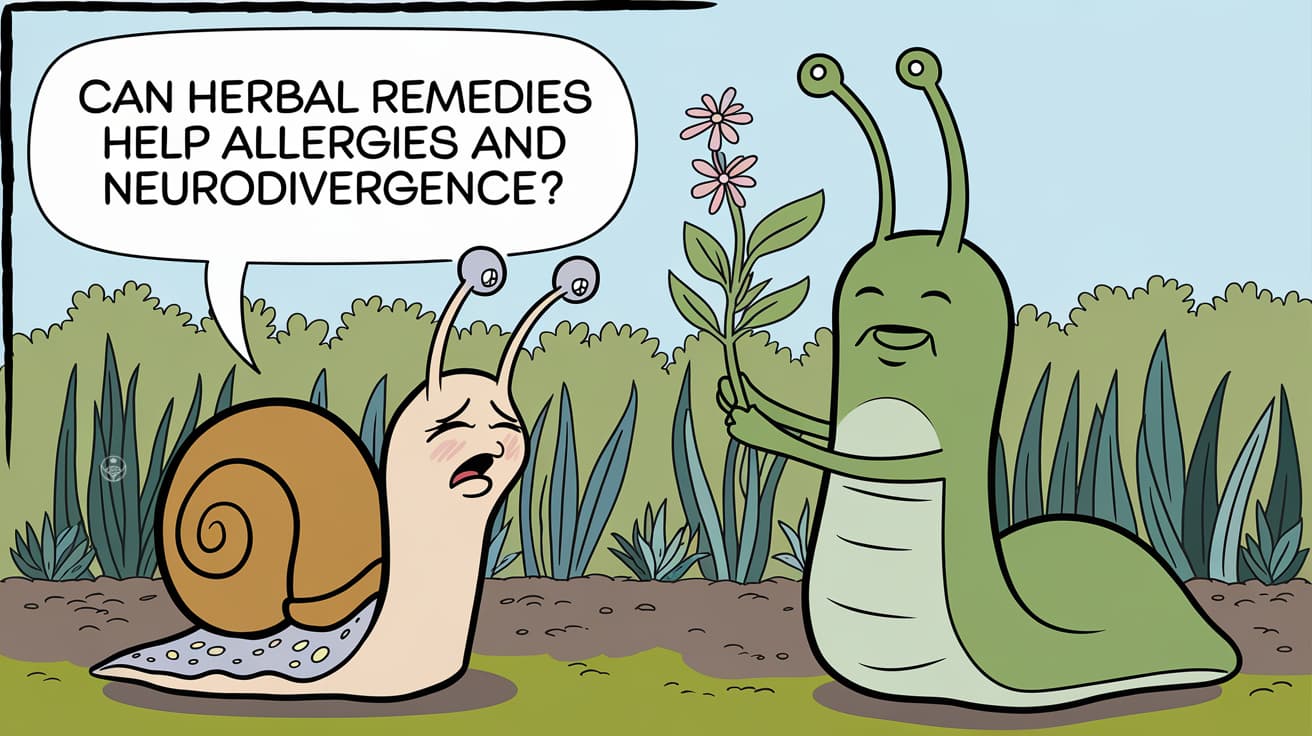
Sniffles and Squiggles: Can Herbal Remedies Help Allergies and Neurodivergence?
If you’ve ever spent a spring day sneezing your soul out while trying to focus on completing a task, you’ll know the unholy union of allergies and neurodivergence. Whether you’re managing ADHD, autism, or any other flavour of neurodivergent brilliance, life can already feel like herding cats in a wind tunnel. Add a dose of hay fever or a dust allergy, and it’s chaos with a side of tissues. But here’s the question: Can herbal remedies for allergies and neurodivergence, those leafy darlings of the wellness world, actually help?
The Allergy Menace: A Quick Refresher (Or a Quick Sniffle)
Allergies are your immune system’s melodramatic overreaction to harmless substances like pollen, pet dander, or that one flower your neighbour insists on planting. Symptoms range from itchy eyes and sneezing to full-on sinus warfare.
Now imagine tackling those symptoms while your neurodivergent brain is already trying to decode social cues or remember if you turned the oven off. It’s like juggling flaming torches while riding a unicycle—impressive but hazardous.
Unlock peak brain performance with science-backed biohacks. Join free now & get your guide for just £4.99 (45% off)!

Herbal Allies: Friends or Fads?
Herbal remedies have been around for centuries, promising relief from everything from headaches to heartbreak. For allergies, popular choices include:
- Butterbur: Said to reduce inflammation and act as a natural antihistamine. (Though let’s be real, the name sounds like a spell from Harry Potter.)
- Stinging Nettle: Packed with antioxidants, it may help with hay fever. But, pro tip: don’t touch it directly unless you enjoy tingling palms.
- Peppermint: Great for clearing sinuses and smelling like a festive chewing gum.
For neurodivergence, herbal remedies often focus on supporting focus and relaxation:
- Ginkgo Biloba: Touted for improving memory and concentration. (Side effects may include googling how to pronounce it.)
- Ashwagandha: A favourite for stress relief. Bonus: it sounds fancy when you drop it into conversation.
- Chamomile: Calming and doubles as a nice bedtime tea. Perfect for winding down after a day of masking.
The Humorous Truth: Do They Work?
Ah, the million-dollar question. Herbal remedies have their fans and sceptics, and the science is, well, leafy. Some studies suggest benefits, while others find them no better than a placebo. But hey, if drinking nettle tea while listening to calming rain sounds works for you, who’s to judge?
A Note on Safety (Because This Isn’t Hogwarts)
Before you raid your garden for remedies, consult a healthcare professional. Some herbs can interact with medications or cause side effects. And no, sprinkling dried lavender on your cereal is not a substitute for professional advice.
Managing the Madness
While herbs might offer a little support, they’re not magic bullets. For allergies, consider air purifiers, antihistamines, or wearing one of those dramatic face masks that scream “I’m mysterious and pollen-free.” For neurodivergence, lean on tools like planners, noise-cancelling headphones, and the power of saying “no” to overwhelming commitments.
In Conclusion: Herbs, Humour, and Hope
Can herbal remedies for allergies and neurodivergence help? Maybe. Will they make life’s chaos slightly more amusing? Definitely. At the very least, you’ll get to experiment with quirky teas and impress your friends with phrases like “I’m taking Butterbur for my histamines.”
So, here’s to embracing the sniffles and squiggles with a dash of humour, a splash of herbal tea, and a big dose of self-compassion. Cheers to that!
Join the Herbal Biohacker Community
At Herbal Biohacker, we’re all about exploring unconventional, natural, and effective ways to optimise neurodivergent and neurotypical minds alike. Join our community for tips, insights, and honest discussions about alternative therapies like homeopathy. Together, we’ll navigate the fascinating world of holistic health.






